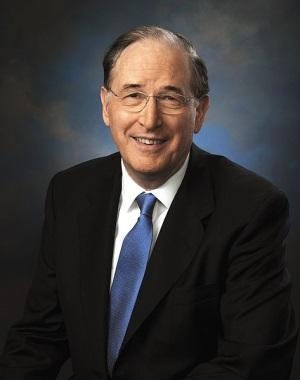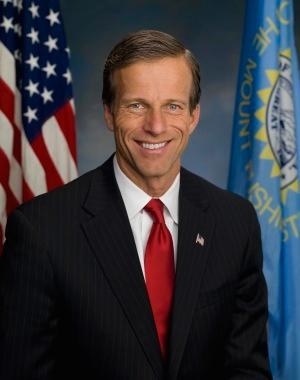Senate Commerce Committee Holds Oversight Hearing
Senators John D. (Jay) Rockefeller IV (D-WV), chair of the Senate Commerce Committee, and Senator John Thune (R-SD), the committee's ranking Republican, offered different views of the Transportation Security Agency at an oversight hearing held by the committee Wednesday.

"I believe our aviation system is safer than it has ever been. Since the TSA was created, we have seen no successful air attacks on American soil despite significant and sophisticated efforts by our enemies," Rockefeller (pictured) said in his opening remarks. "We are also doing a better job at pre-empting dangerous people and goods from getting on aircraft. And, better intelligence has resulted in real policy changes. This has allowed authorities to act faster than ever to guarantee travelers’ safety. Screening at American airports has also evolved and improved. The TSA is harnessing advances in technology while adequately balancing privacy concerns. As a result, we’ve seen shorter wait times – more than 99 percent of passengers move through security in less than 20 minutes. That is a far cry from the days when security lines were several hours long.
"A lot of credit for these changes goes to the TSA’s new risk-based approach to security – an approach that is championed by Administrator Pistole. How we refine, and fund, these risk-based approaches will determine how successful we are in adapting to ever-evolving security concerns. In the next decade, for example, air travel is predicted to grow from 700 million to 1 billion people annually. We should be spending more money today to handle the sheer volume of travelers expected tomorrow.
Rockefeller called on the committee, and Congress as a whole, to provide full funding for the agency. "In aviation, where we are focusing the bulk of our resources, more work must be done," the chairman said. "I continue to be concerned about the gaps in general aviation security. Let us not forget that a private plane could wreak just as much terror as a commercial jetliner. Recent incidents have further raised important questions about the security of our airports. In November, there was a tragic shooting at Los Angeles International Airport. One TSA employee was killed and 7 others were injured. And last week, a teenager was able to clear an airport fence in California and stowaway on a flight, completely undetected, until he landed in Hawaii. If anything, these episodes underscore the need to continually reevaluate and improve our efforts.
"In the thirteen years since TSA was created, we have learned that transportation issues are not becoming easier to overcome. That’s because our world is becoming more complex, with ever-evolving and even more sophisticated threats to our security. One of the only ways we are going to meet these challenges is to provide the TSA with the resources it needs to get its job done. And to improve the overall security of our transportation systems, those resources must be allocated wisely across aviation and surface transportation programs.
"The men and women of the Transportation Security Administration have done far more than they receive credit for to improve our nation’s security. It is too often a thankless task with few good options and too few resources. I can say, with confidence, that the TSA is on the right track under the leadership of Administrator Pistole. Certainly, more work needs to be done, but I know the current leadership and workforce is up to the task. The looming question now is whether Congress is ready to give up its stubborn hold on resources the TSA needs to meet its mission."

Thune (pictured), on the other hand, was more critical of the agency. "Last week, a public opinion survey released by Harris Poll found that only half of respondents thought that TSA security screening procedures make air travel safer," Thune said. "Given this measure of public skepticism, which may reflect the fact that we thankfully haven’t experienced another 9/11 style attack, I hope the administrator can explain how his recent efforts to implement a risk-based approach to transportation security at the agency make it more efficient and effective at fulfilling its mission of securing the nation’s transportation systems.
"I know Administrator Pistole has made this intelligence-driven approach a top priority, and has brought his former law enforcement experience to bear in the process." Thune said. "At the same time, there have been a number of recent security breaches in the news that have raised concerns about TSA’s ability to oversee and regulate airport security beyond the screening of passengers and baggage. Last November, an individual entered a Los Angeles International Airport terminal and shot a bystander and three TSA employees, one of whom—Gerardo Hernandez—tragically died from his injuries. And just last week, a teenage stowaway scaled an airport perimeter fence, climbed into an airplane wheel well, and somehow survived a flight from San Jose to Maui, Hawaii.
"Industry stakeholders have also criticized TSA for making it difficult for industry to plan ahead and invest in innovative research and development. Mr. Chairman, as we consider TSA’s use of its resources, I also want to note my concerns about recent increases to the passenger aviation security fee adopted under the Bipartisan Budget Act of 2013. The act, which was drafted without authorizing committee input, raises the passenger fee on July 1st to $5.60 per passenger per one-way flight, and diverts $12.6 billion of the total fees generated over the next 10 years to deficit reduction rather than aviation security. While I certainly support deficit reduction, I do not think that the air traveling public should be singled out to pay for it.
"In addition, commercial airlines have expressed concerns about TSA’s implementation of the increased fee, specifically the elimination of the one-way trip cap and the resulting cost increases for long, multi-leg, round-trip travel. I look forward to hearing clarification from the administrator on exactly how the TSA will implement this fee change," Thune said.
 ANN's Daily Aero-Term (04.26.24): DETRESFA (Distress Phrase)
ANN's Daily Aero-Term (04.26.24): DETRESFA (Distress Phrase) Aero-News: Quote of the Day (04.26.24)
Aero-News: Quote of the Day (04.26.24) ANN's Daily Aero-Term (04.27.24): Direct
ANN's Daily Aero-Term (04.27.24): Direct ANN's Daily Aero-Linx (04.27.24)
ANN's Daily Aero-Linx (04.27.24) Aero-News: Quote of the Day (04.27.24)
Aero-News: Quote of the Day (04.27.24)




